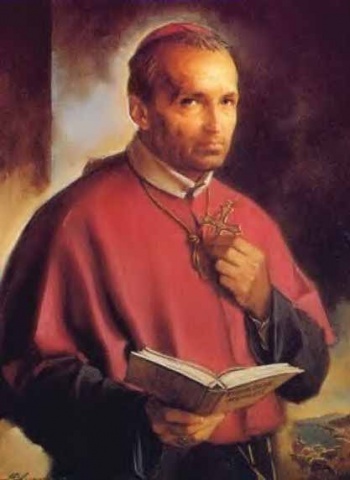St. Alphonsus Liguori
St. Alphonsus was born in Naples in 1696. Saint Alphonsus Liguori (September 27, 1696 – August 1, 1787) was an Italian Catholic Bishop, spiritual writer, theologian, and founder of the Redemptorists, an influential religious order. He was canonized in 1839 by Pope Gregory XVI and declared a Doctor of the Church.
Conditions
Biography
Saint Alphonsus Mary Antony John Cosmas Damian Michael Gaspard de' Liguori was born in Marianella, near Naples, then part of the Kingdom of Naples. He was the first-born of seven belonging to the Neapolitan nobility. Two days after he was born he was baptized at the Church of Our Lady the Virgin as Alphonsus Mary Antony John Cosmas Damian Michael Gaspard de' Liguori. Alphonsus Liguori went to law school at age sixteen, becoming a very well-known lawyer. He was thinking of leaving the profession, and wrote to someone: "My friend, our profession is too full of difficulties and dangers; we lead an unhappy life and run risk of dying an unhappy death. For myself, I will quit this career, which does not suit me; for I wish to secure the salvation of my soul."[3] At the age of twenty-seven, after having lost an important case, he made a firm resolution to leave the profession of lawyer.
In 1723, after a long process of discernment, he abandoned his legal career and, despite his father's strong opposition (and reluctant consent), began his seminary studies in preparation for the priesthood in the Oratory of St. Philip Neri. He was ordained a priest on December 21, 1726, at the age of 30. He lived his first years as a priest with the homeless and marginalized youth of Naples. He founded the "Evening Chapels." Run by the young people themselves, these chapels were centers of prayer and piety, preaching, community, social activities, and education. At the time of his death, there were 72 of these chapels with over 10,000 active participants. His sermons were very effective at converting those who were alienated from their faith.
The saint suffered from scruples much of his adult life, and felt guilt about the most minor issues relating to sin. Moreover, the saint viewed scruples as a blessing at times, he wrote: "Scruples are useful in the beginning of conversion.... they cleanse the soul, and at the same time make it careful".
In 1729 Alphonsus left his family home and took up residence in the Chinese College in Naples. It was there that he began his missionary experience in the interior regions of the Kingdom of Naples where he found people who were much poorer and more abandoned than any of the street children in Naples.
On November 9, 1732, St Alphonsus founded the Congregation of the Most Holy Redeemer, when Sister Maria Celeste Crostarosa told him that it had been revealed to her that he was the one God had chosen to found the Congregation. This order's goal was to teach and preach in the slums of cities and other poor places. They also fought Jansenism which was a heresy that denied humans free will and barred many Catholics from receiving the Eucharist. He gave himself entirely to this new mission. A companion order of nuns was founded simultaneously by Sister Maria Celeste.
Alphonsus was consecrated Bishop of Sant'Agata dei Goti in 1762. He tried to refuse the appointment, proposing his age and infirmities as arguments against his consecration. During this time he wrote sermons, books, and articles to encourage devotion to the Blessed Sacrament and the Blessed Virgin Mary
In 1775, Alphonsus returned to Pagani, the mother house of the Redemptorists, where he spent the remaining 12 years of his life. Soon the terrible scruples he had overcome years earlier returned. He would constantly send for his confessor. Added to this mental suffering was his physical pain. He had to be lifted in and out of bed. He was put in a wheelchair, which he hated. Yet at least they could wheel him along the corridors and to the chapel. He spoke often of his approaching death.
However, before he died, he became peaceful and calm, and his terrible scruples disappeared. Finally, 1 August 1787, the God whom he served so well called him home.
He was canonized on May 26, 1839, by Pope Gregory XVI, and later proclaimed a Doctor of the Church in 1871 by Pope Pius IX. He was named "Patron of Confessors and Moralists" by Pope Pius XII in 1950, who wrote of him in an encyclical "Haurietis Aquas."
Celebration Day
1 August
pilgrimage
https://en.wikipedia.org/wiki/Redeemer_and_St._Alphonsus_Liguori_titular_church,_Esquiline,_Rome
